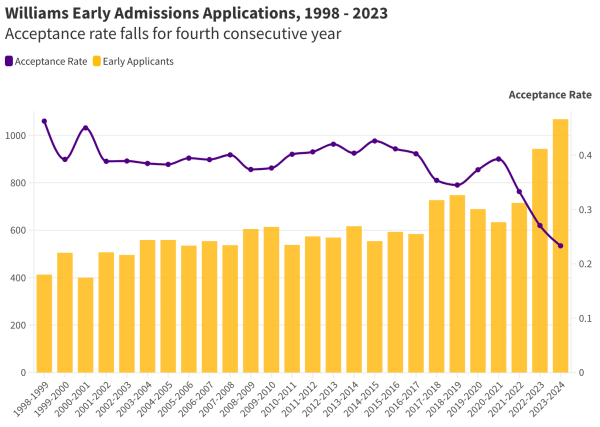
The College admitted 23.3 percent of 1,068 early decision applicants to the Class of 2028 on Dec. 8, according to Dean of Admission and Student Financial Services Liz Creighton ’01. For the second consecutive year, the early decision admission rate was the lowest in the College’s history. The number of early decision applicants has now increased for four years in a row.
The College admitted 249 students, deferred 155 to the regular decision round, and denied admission to 658. Creighton noted that the College typically admits “a small number” of deferred applicants through regular decision in March. Last year, the College admitted 14 deferred early-decision applicants.
In addition to the 249 early-decision admittances, the College welcomed 11 students to the Class of 2028 through QuestBridge’s National College Match program on December 1.
This year marks the second admission cycle since the College announced its all-grant financial aid program, which eliminated all loans and work-study contributions from financial aid packages. In a College survey, nearly a quarter of current first-years on financial aid said that the all-grant program was the deciding factor in their decision to enroll at the College.
This is also the fourth year of the College’s test-optional pilot program, which will extend through the 2025–26 admission cycle. In an email to the Record, Creighton wrote that extending the test-optional policy past 2026 was “certainly under consideration.”
In June, the Supreme Court declared race-conscious admission practices unconstitutional, upending the College’s admissions policies after 51 years of practicing affirmative action. In response, the College has made changes to its policies, including eliminating its supplemental essay. In previous years, the College’s application process had included either a required or optional short written statement.
This year, as a result of the Court’s ruling, admissions readers were not able to view an applicant’s self-disclosed race or ethnicity. However, applicants were still able to discuss experiences related to race in their personal essays, as permitted by the Court’s majority opinion.
“Diversity, inclusion, and access are core values at Williams and nothing about the Court’s decision has changed that,” Creighton wrote to the Record. “Our work over the last several months focused on ensuring that our approach is fully compliant with the law and supports Williams’ goals and priorities.”
The College will continue to assess its admission practices going forward. “We are well accustomed to implementing new strategies, assessing their impact, and refining our efforts, so there will undoubtedly be tweaks [to the admissions process] in the future,” Creighton said. “But I feel very confident about how the QuestBridge and Early Decision processes evolved.”
The Office of Admission and Financial Aid anticipates between 12,000 and 15,000 regular decision applicants, according to Creighton. Last year, the College received 10,315 regular decision applications, and its overall acceptance rate was 9.8 percent.
Creighton described the admitted early decision cohort as “extraordinary.”
“It feels almost unfair that we have to wait until August for them to join the Williams community,” she added. “We can’t wait to see them in action on campus.”
The deadline for regular decision applicants is January 8.














